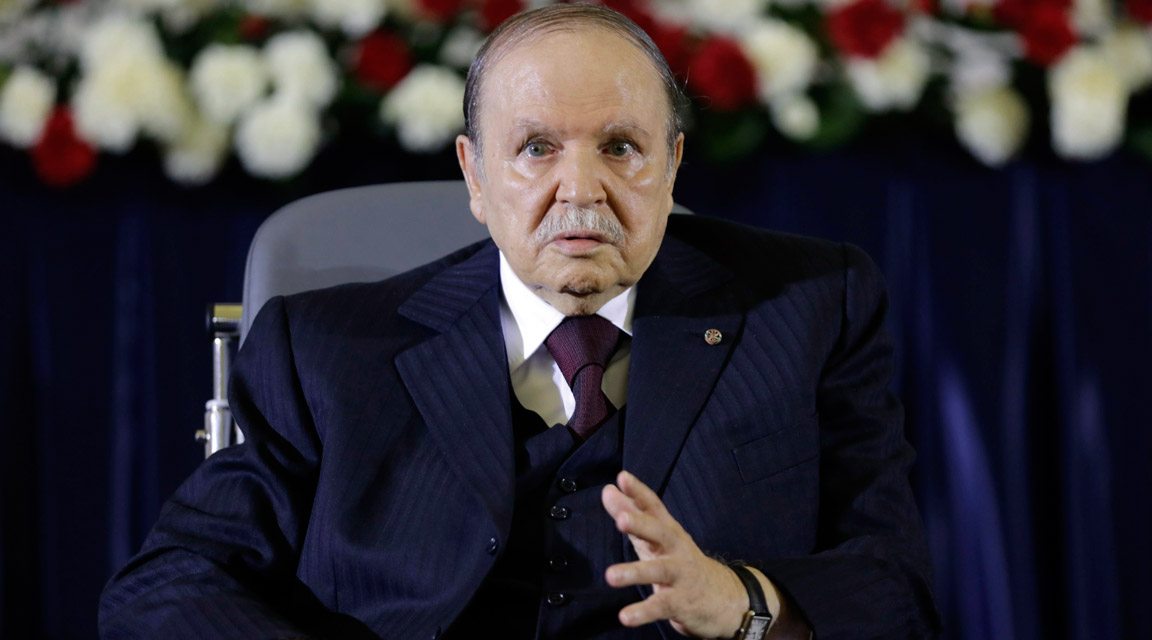

Incumbent Algerian President Abdelaziz Bouteflika has declared his intention to seek a fifth term in the country’s presidential elections in April, after he was endorsed by his party and the ruling coalition.
A statement put out on his behalf by state media confirmed what is reportedly the president’s “unwavering desire to serve” despite not being “the same physical force as before”.
The announcement comes amid growing concerns over the ailing health of Bouteflika, who is now 81 years old, uses a wheelchair, and has rarely been seen in public since suffering a stroke in 2013.
Yet Bouteflika retains widespread respect among the Algerian people for his role in ending the country's decade-long civil war, which killed tens of thousands or even hundreds of thousands of people by some estimates.
His long tenure in office also means he is the only president many Algerians have known, and this has made him a powerful symbol of continuity for the country’s four-party ruling coalition.
It has therefore become politically convenient for the president’s own National Liberation Front (FLN) and its allies to keep Bouteflika in power rather than face political disruption.
Indeed, as early as July 2018, in the absence of an internal consensus over a successor, Prime Minister Ahmed Ouyahia and head of the FLN Djamel Ould Abbes issued a joint appeal for the president to stand again.
Not a done deal
The election’s outcome remains far from certain, of course.
More than 180 candidates have taken to the field, with top challengers including the former prime minister and 2014 presidential runner-up Ali Benflis; the influential retired General Ali Ghediri; and the leader of a moderate Islamist party, Abderazak Makri.
Opposition momentum has also been building for some time, with opposition and civil society figures including politician Ahmed Benbitour and writer Yasmina Khadra publishing an open letter last year arguing that a fifth term for Bouteflika would be a “dramatic mistake”.
Indeed, Algeria faces significant economic challenges including spiralling youth unemployment, and a core opposition argument is that it is precisely change and discontinuity that are required to enact the structural reforms necessary to right the country’s fortunes.
The Washington-based IMF has recommended a number of painful but necessary steps, including the relaxation of foreign exchange control to allow the dinar to depreciate and the easing off of the government’s fiscal stimulus.
But there remains deep opposition to many of the IMF’s goals, and there has been little warming to its suggestions ahead of the election as both the ruling coalition and opposition have sought to steer clear of policy announcements that might prove damaging to their candidates.
The delay and indecision mean, however, that whoever is elected will immediately be presented with the challenge of becoming the public face of some difficult decisions for the government.
Viewed in another light, and as argued by the ruling coalition, Bouteflika could be the only public figure in Algeria capable of navigating the country through what will likely prove a tricky period.
| This article has been unlocked to allow non-subscribers to sample MEED’s content. MEED provides exclusive news, data and analysis on the Middle East every day. For access to MEED’s Middle East business intelligence, subscribe here |
You might also like...

TotalEnergies to acquire remaining 50% SapuraOMV stake
26 April 2024

Hyundai E&C breaks ground on Jafurah gas project
26 April 2024

Abu Dhabi signs air taxi deals
26 April 2024

Spanish developer to invest in Saudi housing
26 April 2024
A MEED Subscription...
Subscribe or upgrade your current MEED.com package to support your strategic planning with the MENA region’s best source of business information. Proceed to our online shop below to find out more about the features in each package.




